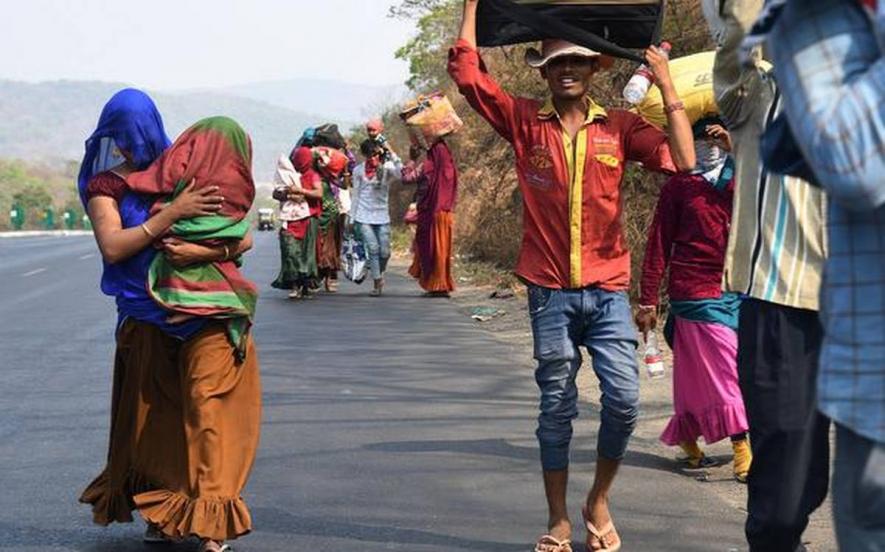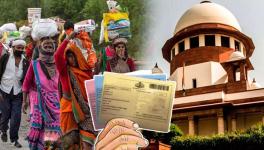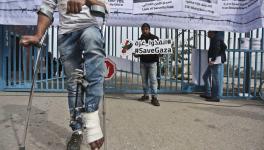Migrant Workers Without Access to Social Protection or Healthcare, Says NHRC Study

Image Courtesy: The Hindu
Social protection and health care of interstate migrant workers is neglected, with a significant number of them living in unhealthy conditions and facing various health-related risks, said a recent study by the National Human Rights Commission (NHRC).
“Indian society and its national government as well as various State governments need to understand and address problems of vulnerable interstate migrant workers who are seen across both rural and urban areas in India. The major chunk of migrant workers is unskilled and employed in unorganised sector,” the study said.
It pointed out that a large number of migrant workers in India are confronted with a wide range of problems, like non-provisioning of entitlements of government schemes, poor access to available schemes and services, inadequate and inappropriate safeguards at worksites, poor quality of accommodation, long working hours, low wages as compared to local workers, limited access to healthcare services, social exclusion, poor social interaction and a lack of integration with the local community.
As part of the study, commissioned by the NHRC and conducted by the Kerala Development Society, researchers interviewed around 4,400 migrant workers, local workers, employers/contractors, state government officials, elected representatives, scholars, experts, NGO representatives and trade unions members across four states/UTs – Delhi, Maharashtra, Gujarat and Haryana. The four house a large number of workers from West Bengal, Assam, Bihar, Uttar Pradesh, Odisha, Jharkhand and Chhattisgarh.
“The typical life cycle of migrant workers requires special provisions for their social security to ensure that they can adequately manage their risks. They move between States and hence between different labour markets and social security systems, which creates specific vulnerabilities. Newly arrived migrant workers are in a vulnerable position as they are away from their home community and have no access to social networks and safety nets,” it added.
The study noted that access to “social and basic services in the new host State is often restricted for many reasons. The lack of access to basic services and portability of social security for interstate migrant workers raises serious concerns about their vulnerabilities. Lack of access to rights and entitlements pose serious problem for migrant workers”.
About 84% of the respondents in Delhi did not have proper accommodation or stayed in poor quality accommodation, according to the study. Inter-state migrants also don’t have access to good health care – except in Delhi, where Mohalla (neighbourhood) clinics have been of help, the study added. About 94.5% of migrant workers covered by the survey had availed public health care services free of cost from Mohalla clinics in Delhi.
Female migrant workers showed a higher prevalence of nutritional deficiencies and have poor access to reproductive health services in comparison with local labourers, the study pointed out. As a result of intense and daily exposure to toxic air, a section of interstate migrant workers, especially women, suffer from asthma, cancer and reproductive health complications.
About 68% of the women covered by the survey do not have access to toilets as they live in slums or squatter settlements. In Mumbai, about 62% of migrant workers live in slums. The study claimed that 43 interstate migrant workers die every month in Delhi, 35 in Gujarat, 41 in Haryana and 38 in Maharashtra. The reasons were accidents at construction sites, suicide, stomach-related diseases and heart ailments.
It also found that 51.2% of migrant workers in Delhi, 53% in Gujarat, 56% in Haryana and 55% in Maharashtra have poor access to available schemes and services due to the lack of adequate information and language barriers.
The NHRC study said that there was a “lack of an institutional mechanism to address human rights violations against interstate migrant workers and absence of Centre-State coordination”.
It added that there was no institutional mechanism, either at the national level or at the state level which would address different types of human rights violations against interstate migrant workers. “A concerted national strategy needs to be formulated to provide access to entitlements and basic services for interstate migrant workers. The experience of interstate migrant workers calls for a supportive policy framework. A multi- pronged strategy with the involvement of Central, State and local governments supported by community based organizations is urgently required to address vexed problems of migrant laborers,” it said.
Get the latest reports & analysis with people's perspective on Protests, movements & deep analytical videos, discussions of the current affairs in your Telegram app. Subscribe to NewsClick's Telegram channel & get Real-Time updates on stories, as they get published on our website.
























